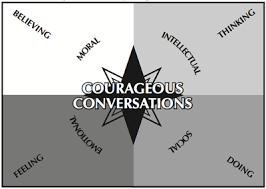Ongoing Racial Injustices Show Us It’s Time for Some Courgeous Conversations

It’s hard to talk about the things that make us uncomfortable but is necessary for change.
May 27, 2021
The recent trial of Derek Chauvin on trial for the murder of George Floyd and one year anniversary of Floyd’s death this week sparked conversations not only in our schools but also hopefully in our homes and communities about the current issues surrounding racial injustice. Having courageous conversations within our communities about injustices and inequality allows us to become more involved with change regarding our judicial system. It educates others and ourselves regarding the issues within our government, making us understand that some issues are DEEPER than politics.
It is people’s lives that are being affected when injustice is taking place, and it must be addressed with these conversations that may either be too uncomfortable but necessary for us to discuss. The more uncomfortable conversations we have regarding injustice and inequity, the more we will grow into the topic and actually recognize the genuine issues that minorities face. It is important to be knowledgeable about other groups of people who may receive different treatment from not only their government, but their communities and society as well.
The social injustice issues within the United States affect everyone in some manner; some more than others. Kenwood junior AH shares, “I identify as a black male. With me being black, I have experienced things people of other ethnicities may not understand. Taking into account my own experiences and my family’s, it’s shocking that something so clear and obvious to me is being debated upon.”
Without seeing and listening to those who may receive different racial treatment from society, we become complicit to another community’s issues and only focus on how it affects ourselves. It is important to have these courageous conversations and listen for the insight it may give us. As we gain more awareness regarding other communities, our country, and even others, it forces us to get out of our own biased mindset and be more involved with not only listening, but also being invested in learning how to make change.
Kenwood junior Eliza B adds, “Though change is happening I’m still not comfortable enough to trust the justice system completely. We’ve taken steps as a society in the right direction, but we haven’t completed our journey yet. There are still a lot of problems that surround the justice system and there are still a lot of changes to be made to reform a system that was made to oppress black people.”
The more people know what is going on outside of their own sense of reality makes them feel remorse and even encouraged to act for change. These conflicts that are ingrained in our society make it very difficult to avoid as it affects all of us in some manner. It’s easy to say injustice is not our problem because it doesn’t personally affect us, but injustices and inequity should never be normalized. When it is normalized it’s definitely way past time for some uncomfortable, hard conversations.
“It is long past time for us to have conversations about injustices and inequalities. Not only should we have them but it’s time to get past the discomfort of having these conversations. I can see how it may make people feel uncomfortable, but if we discuss the injustices we see regularly we will start to normalize confronting difficult conversations. If we make taboo subjects socially acceptable it will allow us to move forward and face even more difficult issues in the future,” shares Kenwood junior Gabe B.
In order for change to occur, having courageous conversations is the first step to do so. Regardless of the lack of comfortability it can bring to some, it allows more people to think more in depth regarding the issues of our society. If we don’t speak, the conflicts will just continue.
